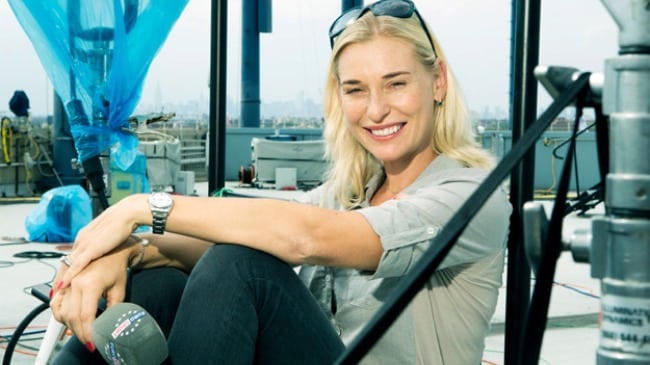Interview by Giulio Gasparin (@GiulioGasparin), with the cooperation of Michele Galoppini (@MikGaloppini)
When we think of Austria, the first image we have in mind is made of the Alps, the snowy peaks, the uncontaminated nature. If we close our eyes we can hear the sound of Mozart’s best tracks being played while we are dancing to a waltz or tasting some delicious desserts like a slice of Sacher Torte, or the most ancient cake in the world, the Linzer Torte. Yet, if you like tennis, you can immediately associate Austria with a number of players that made it to the news for this or that reason. These days all eyes are on Dominic Thiem, but not long ago Tamira Paszek was the young gun in 2007 reaching Wimbledon and US Open fourth rounds. Sybille Bammer made herself a name for being the only player to have never lost to Serena Williams having played her more than once. A little before these top Austrian players, there was one player who constantly featured in the top of rankings and her name is as famous these days for her contribution to Eurosport: Barbara Schett-Eagle. In a very packed era of women tennis stars, Schett reached the highlights of her career by capturing 3 WTA titles, a best ranking at number 7 in singles and 8 in doubles, as well as reaching the second week at each slam at least once.
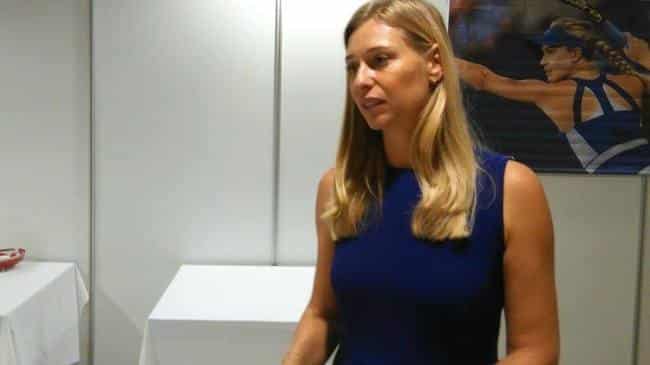 We met her in Linz, where she works for the tournament, and we involved in a very pleasant chat that lead into this feature, where many topics are discussed, from the future of Austrian tennis, to her new career as a commentator, from holidays to her love for Italy. But the first thing that flashed clear, despite the broad smile and the welcoming manners, was the tiredness from a long week of work, as the final match was about to start.
We met her in Linz, where she works for the tournament, and we involved in a very pleasant chat that lead into this feature, where many topics are discussed, from the future of Austrian tennis, to her new career as a commentator, from holidays to her love for Italy. But the first thing that flashed clear, despite the broad smile and the welcoming manners, was the tiredness from a long week of work, as the final match was about to start.
“You know, my week has been quite busy ,obviously, with lot of obstacles, challenges and certain things you don’t have in your hands, but it has been good, overall. You know, this is the only time I am working for a tournament and it’s nice, I like it. With that you know how much effort it goes in organizing a tournament. It has been good, but these were long days of course.”
In that I have a feeling that Schett’s routine has not changed much from the days she was playing tennis on the tour. It was late in October when we met and she was coming from working at the US Open and now in Linz, I was sure she needed some “off season” and indeed she was ready for holiday.
“I’m going to Italy soon… Tomorrow actually! I live in Innsbruck while I’m here in Austria, and it’s close to Italy and I will go to Portofino and Santa Margherita, to Cinque Terre, just along the coast. I’m really looking forward to it, I’m ready (smile)!”
I did not want to be a coach,
but maybe TV? I like talking!
As we broke the ice with a little chat over the beauties of the Italian coast, it felt I could ask something I was really curious about. Even if in Linz she was not working for Eurosport, I asked her how she ended up working for them. Very relaxedly, she revealed no secret and admitted a little luck, as well as great initiative and a good dose of hard work.
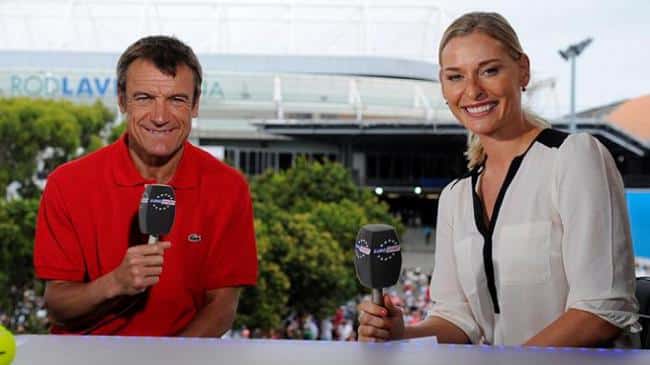
“Well, when I played, actually, I sometimes got asked by German Eurosport commentators if I wanted to commentate with them, because they were always there at tournaments. And then, in last year before I retired, in 2004, I already thought ‘well, where do I want to go? What direction do I want to head on?’; I didn’t want to be a coach on court, but I wanted, maybe, to do something for television, cause I really like talking and stuff like that (smile). Then one commentator was talking to some heads of Eurosport about me and everything started in 2005 right away. It was just something very small, just few interviews here and there. Surely if I’d look at those interviews I’d be shocked (smile). Then everything grew up, first it was just French Open, then it was French and Us Open, and then Australian Open, and it became more and more work for me and I got better and better. Last year I had this opportunity to host the show with Mats Wilander… it’s 11 years now since I had the opportunity to work with them and we are kind of a family, such good friends now. It’s all still getting bigger and bigger, even some of your colleagues are travelling more for Eurosport Italy. It’s very exciting and I love doing it, also if it is very tiring and tense being on site, as you can imagine, but if you are in a good team with nice people you love doing it. Obviously this is the case and I hope it’s going to go on forever (smile), I mean, not forever, but for a long time (laugh).”
It then felt about time we talked about tennis, as in Linz she received one of her first Wild Cards back in the days.
“Back in the days, indeed! That’s right (laugh). It was like 20 years ago… It is special to come back here, indeed. I remember very clearly the first time I played here: obviously it has all changed, it is a little more modern than it used to be. But I remember it has been quite overwhelming, it was the first WTA event I have played, I was kind of petrified as well because I was the unknown, I didn’t know anyone, everybody spoke English, then it was WTA, there were supervisor, umpires, ball kids. I didn’t play well obviously (smile) and I lost first round.”
Eventually, things went noticeably better for her in what still is nowadays the most important WTA event to be held in Austria. This year the Generali Linz blew 25 candles on its cake, celebrating a quarter of a century in the business is no joke and Schett likes to be an active part of the work it takes to run successfully such a tournament.
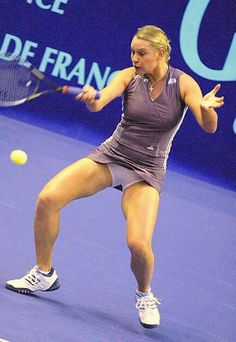 “It was one or two years later and I had my first top10 win right away and it was a fantastic experience. The Austrian press suddenly wanted to talk to me and stuff like that… it is just nice to see the difference from then, how the tournament developed. And I’m always happy that I’m involved in it because I’ve known Sandra [Reichel, the tournament director] since so long, I’ve played doubles with her as well, so I just try to support her in this week, obviously during the year I’m quite busy, but it’s a lot of fun. I think that if you look at the tournament, it doesn’t look like an International event at all, but more like a Premier or something like that. It has become quite popular also among the players, so I think we can just be proud of that. I’m proud of it and I am part of it since 23 years! Kind of, in a certain way…”
“It was one or two years later and I had my first top10 win right away and it was a fantastic experience. The Austrian press suddenly wanted to talk to me and stuff like that… it is just nice to see the difference from then, how the tournament developed. And I’m always happy that I’m involved in it because I’ve known Sandra [Reichel, the tournament director] since so long, I’ve played doubles with her as well, so I just try to support her in this week, obviously during the year I’m quite busy, but it’s a lot of fun. I think that if you look at the tournament, it doesn’t look like an International event at all, but more like a Premier or something like that. It has become quite popular also among the players, so I think we can just be proud of that. I’m proud of it and I am part of it since 23 years! Kind of, in a certain way…”
The success of the event is even more remarkably big, given the hub of the action in the WTA tour has moved strongly to Asia, leaving the indoor swing that characterized the European autumn with only few survivors. For this reason, many players have been talking about how much they miss the European events near the end of the season and Schett could not but echo their thoughts.
“There used to be many more tournaments when I used to play. I remember I was used to drive from Filderstadt, which has now been replaced by Stuttgart and moved to spring, to Zurich, and from Zurich to Linz, and then I could have taken a flight to Moscow, if I felt like! But now a lot of tournaments are played in Asia and of course Europeans prefer to play in Europe and they are struggling with this situation. It is just different, you know, for Europeans to be there. I hope there’s going to be more people trying to organize events in Europe, but it’s not easy obviously; to put up these tournaments you need so much money and you have to find the sponsors. Maybe Italy could make a few more now that tennis is so popular!”
Palermo was my favourite tournament, for some reasons
I had many Italian fans!
As she added that with a smile, it came natural to ask about her special relationship with her neighbour country. In Palermo, in 1996, she reached her first WTA final and happened to win it as well.
 “Yeah! It was my favourite tournament, I loved it. I have always played well there, I think I won there, I played a final, a semifinal, I won also in doubles. I don’t know why I played so well there. For some reasons I had lots of fans in Italy, maybe cause I played in Italy a lot of junior tournaments or $10.000 tournaments. It was quick, I just had to drive South and I was there. But Palermo was very special, the matches didn’t start until late, so there were night matches, and I loved the food. When I was happy I usually played well, so it is pretty clear it made me happy to go there. Then the clay was also a little bit quicker and I am waiting for them to make some anniversary soon, so I can go there one day as well. You know, it was fantastic to win my first title there, it was very special and I remember it really well and hence I have a special bond now with the city.”
“Yeah! It was my favourite tournament, I loved it. I have always played well there, I think I won there, I played a final, a semifinal, I won also in doubles. I don’t know why I played so well there. For some reasons I had lots of fans in Italy, maybe cause I played in Italy a lot of junior tournaments or $10.000 tournaments. It was quick, I just had to drive South and I was there. But Palermo was very special, the matches didn’t start until late, so there were night matches, and I loved the food. When I was happy I usually played well, so it is pretty clear it made me happy to go there. Then the clay was also a little bit quicker and I am waiting for them to make some anniversary soon, so I can go there one day as well. You know, it was fantastic to win my first title there, it was very special and I remember it really well and hence I have a special bond now with the city.”
Winning at your first final is pretty remarkable indeed, but this is not something everyone can do. In the years we have seen many players struggling to seize their first title and fall into terribly long losing streaks in the finals of tournaments before achieving that goal and possibly at bigger stages. The titles of US Open for Sam Stosur and Roland Garros for Francesca Schiavone erased from the memory of most their terrible record in finals before these. Simona Halep started her climb only after winning her first title on the fourth attempt.
“When you play your first final you are going to be nervous obviously, so you need to stay positive, enjoy the moment and stick to your strengths, nothing to lose. It always is a special moment to play your first final.”
Things have changed a lot. When I was 16, I knew only that I shouldn’t have too many Cokes or Fantas or shouldn’t ate too many pizzas, but I didn’t know more…
Maybe not as special, but another important milestone is to play your first ever tournament, something that she experienced in Kitzbuehel , a resort that is far more famous for the most heroic downhill of the ski world cup, than for tennis. But there she received her very first wild card, a fact that left her surprised we knew: “Yes, it is true, you guys did your researches, well done!” Then following a general laugh, we discussed the topic of Wild Cards, but surprisingly she expressed a different views from most.
“I think it’s important for young players to have opportunities to be part of these events, even though they don’t win a match, because it is important to build some experience. But if you want to be a good player, one day you have to be able to go through qualies as well. I think, whenever I got a wild card, only few times I played really well. In the end, it is better for your self-confidence if you work your way through the rankings and the qualifications than having a wild card that makes it easier for you. I think it’s good for young players to get the experience. Maybe they are all ranked a little bit too low and it’s a bit overwhelming for them, but they are doing well here in Austria. Barbara Haas and Mira Antonitsch played really well and I was impressed by them. But at the end of the day, if you want to be a top 10 player or number one in the world you have to beat everyone anyway, if you get a wild card or not. That’s what players should think, they should not depend on wild cards: they should take it if they get one, but at the end of the day one should play qualies and do well there.”
Reconnecting the thoughts I expressed in the opening of this article, Austria has always been capable of producing good players through the years, with a couple of top 100 players in WTA rankings for most of the past seasons, but lately it seemed to have been missing a few youngsters to take the place of the retired Meusburger, Bammer and Schett, of course.
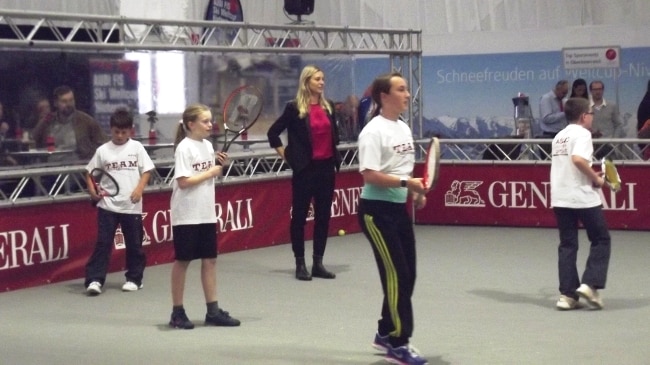 “Barbara Haas is a little bit older, she is 19, but she has really developed in last year, she has been practicing with her coach here in Upper Austria, she is more aggressive on court and that’s what I like. There’s still a long way to go but I think she will definitely arrive. We really need someone in top100, we have no top200 right now and I think this is ridiculous and this has to change! She is not really tall and strong, but she moves really well and she has the mental side, she is strong in that. She can definitely break the top100, she just has to believe it. She had a great time playing here in front of her home crowd, which is a good sign. And Mira Antonitsch is young, she is 16, she really likes using the variations she has and she is a fighter as well. You know, she is surrounded by good people, her parents have obviously both played, her father was a very good player, so they know how to give her the best surrounding and the best team. They are very much into fitness and nutrition and it’s good for her. You know, when I was 16, I knew only that I shouldn’t have too many Cokes or Fantas or shouldn’t ate too many pizzas, but I didn’t know more… So she is really professional, she really loves the game and this is important as well. If her body holds up, cause she had few injuries here and there, I think she can definitely be top100 too for sure.”
“Barbara Haas is a little bit older, she is 19, but she has really developed in last year, she has been practicing with her coach here in Upper Austria, she is more aggressive on court and that’s what I like. There’s still a long way to go but I think she will definitely arrive. We really need someone in top100, we have no top200 right now and I think this is ridiculous and this has to change! She is not really tall and strong, but she moves really well and she has the mental side, she is strong in that. She can definitely break the top100, she just has to believe it. She had a great time playing here in front of her home crowd, which is a good sign. And Mira Antonitsch is young, she is 16, she really likes using the variations she has and she is a fighter as well. You know, she is surrounded by good people, her parents have obviously both played, her father was a very good player, so they know how to give her the best surrounding and the best team. They are very much into fitness and nutrition and it’s good for her. You know, when I was 16, I knew only that I shouldn’t have too many Cokes or Fantas or shouldn’t ate too many pizzas, but I didn’t know more… So she is really professional, she really loves the game and this is important as well. If her body holds up, cause she had few injuries here and there, I think she can definitely be top100 too for sure.”
I really enjoyed the US Open final. There was so much passion, it was not like watching two machines.
It was refreshing and Flavia announcing her retirement like that?
For someone who said not to want to become a coach, it is pretty clear that her ‘eye’ is still very attentive and accurate, something that she clearly keeps trained during her trips with Eurosport, where she analyses matches and previews them with Mats Wilander. In the latest of her trips, she was on sight for the biggest surprise of the year, so it was clear at some point we would go to the topic of the surprising US Open final. One more reason why, because Schett played against Flavia Pennetta twice in her career.
“You must be still really excited about it… Who would have thought?! I mean, I would have never thought that the two of them would have been in the final, really. I mean, I know they are really talented and they can reach semifinals or quarters, but never an all Italian final! But I have to say I enjoyed it a lot, it was not like they were two machines there, they were really passionate and the speeches afterwards and everything was… and the quality was fine too, probably they were nervous also, but I love all the variations, I know them and they are very passionate about the sport, like they were passionate in the speeches. It was everything so refreshing and they showed that everybody can achieve that and I think other players watching them thought they could win a Grand Slam too.
“If Flavia can do it, why can’t I do it? In a positive way, of course. It was great to see those girls, over 30. And I played against both of them, which is funny and made me think that maybe I should have played a little bit longer (laugh). Yeah, it was great and I’m sure in Italy now they are really popular and tennis even more popular than before. I thought it was very cool for Flavia to announce her retirement as well. It shows that she is a very strong character and it’s not all about money. And it is a great finish, you are at the top, and how nice it is be to finish a career like that, with a slam at the WTA Finals? I mean, she has been around for so long, I’m totally understanding. One doesn’t want to drop in the rankings and then retire. She will always be remember as the Us Open winner.”
Leggi anche:
- None Found

